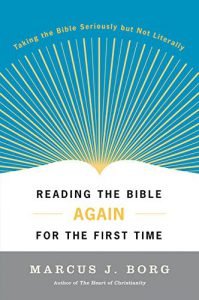 Note: This series is based on the book Reading the Bible Again For the First Time: Taking the Bible Seriously But Not Literally, by Marcus Borg.
Note: This series is based on the book Reading the Bible Again For the First Time: Taking the Bible Seriously But Not Literally, by Marcus Borg.
This week, we continue our exploration of the sacred texts that make up the Christian Bible with the core writings that help Christians claim their unique identity of faith: the Gospels. The four books of the Gospels share the “good news” of Jesus Christ with the world, telling age-old stories of miracles and teachings, criticisms and prophesies. These stories tell us in compelling and imaginative ways who Jesus is and why Jesus matters.
Written between roughly 65 and 100 CE, the four Gospels (Matthew, Mark, Luke, John) were written after Paul’s letters and therefore are not the first Christian writings (the remainder of the New Testament was likely written around the same time as the Gospels). We will explore each Gospel’s foundational themes, to whom they were likely written, and how we can use this knowledge to bring deeper meaning to these central and indispensable writings.
Luke 1:1-4; 3:1a, 2-6, 15-17, 21-22 (CEB)
1 1Many people have already applied themselves to the task of compiling an account of the events that have been fulfilled among us. 2They used what the original eyewitnesses and servants of the word handed down to us. 3Now, after having investigated everything carefully from the beginning, I have also decided to write a carefully ordered account for you, most honorable Theophilus. 4I want you to have confidence in the soundness of the instruction you have received.3 1aIn the fifteenth year of the rule of the emperor Tiberius… 2during the high priesthood of Annas and Caiaphas—God’s word came to John son of Zechariah in the wilderness. 3John went throughout the region of the Jordan River, calling for people to be baptized to show that they were changing their hearts and lives and wanted God to forgive their sins. 4This is just as it was written in the scroll of the words of Isaiah the prophet,
A voice crying out in the wilderness:
“Prepare the way for the Lord;
make his paths straight.
5Every valley will be filled,
and every mountain and hill will be leveled.
The crooked will be made straight
and the rough places made smooth.
6All humanity will see God’s salvation.”15The people were filled with expectation, and everyone wondered whether John might be the Christ. 16John replied to them all, “I baptize you with water, but the one who is more powerful than me is coming. I’m not worthy to loosen the strap of his sandals. He will baptize you with the Holy Spirit and fire. 17The shovel he uses to sift the wheat from the husks is in his hands. He will clean out his threshing area and bring the wheat into his barn. But he will burn the husks with a fire that can’t be put out.”
21When everyone was being baptized, Jesus also was baptized. While he was praying, heaven was opened 22and the Holy Spirit came down on him in bodily form like a dove. And there was a voice from heaven: “You are my Son, whom I dearly love; in you I find happiness.”
Consider these questions:
- What have you been taught about the Gospels? Are they history? Are they campfire stories? Something else?
- The text above (Luke 1:3) indicates that its author was writing from a collection of written sources and investigation. What does this say about its contents and authorship?
- What Gospel stories stand out to you as the most meaningful and/or memorable? Why?
Post-Sermon Update on 1/29
Audio from the sermon can be heard below, and video can be found at this link (will open in a new tab).
Sunday’s sermon was – once again – lengthy and filled with information. Part of what was discussed was how each of the four Gospels gives us a clue as to its approach to the Good News of Jesus in its inaugural scene or address:
- Mark: “Here comes god’s kingdom!” (in 1:15)
- Matthew: The Sermon on the Mount (chapters 5-7)
- Luke-Acts: The Spirit of the Lord (in 4:18-19)
- John: Wedding at Cana in Galilee (in 2:1-12)
Consider reading these Gospels again while keeping these inaugural scenes in mind. I suggest that doing so brings into clearer focus each Gospel’s message and their central claims of an extraordinary Jesus – our Christ.
Consider these questions:
- When you have read the Gospels, what did you think about the various differences or even outright conflicting accounts? Did (or do) these things bother you?
- What does the idea of an inaugural scene or address say to you about how to read the Gospels again? Do you think this will affect your reading? If so, how?
- The sermon described the Gospels as Christianity’s primal (as in primary) narrative, our identifying story. Does this ring true for you? What does it mean, and how does this affect your experience of God?
